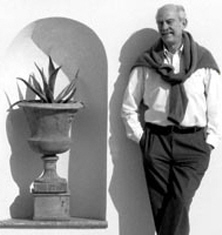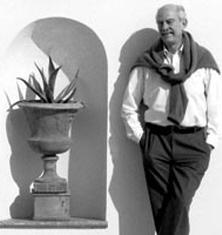
When Berkeley West Edge Opera presents Handel’s Xerxes this month, it will be under the assured musical direction of Alan Curtis. The conductor, a Baroque music specialist, served on the faculty of UC Berkeley from 1960 to 1999, but now lives in Florence, Italy, and spends much of his time working in Europe. In an interview earlier this week, though, he said he’s happy to be back in the Bay Area, visiting family and friends, and leading Handel’s brilliant 1738 comedy. Directed by Berkeley West Edge’s Artistic Director Mark Streshinsky and starring mezzo-soprano Paula Rasmussen in the title role, the new production is scheduled for performances Nov. 13, 19, and 21 at the El Cerrito Performing Arts Theater.
What is involved in reviving Xerxes for this production?
First of all, we do make cuts. In Europe right now, people are doing complete operas, even when they’re four hours long. There are certain places, including Vienna, Paris, and Madrid, where we’ve been able to do even concert versions of three-and-a-half or four-hour operas. But that wasn’t what we wanted to do here. We wanted to make something that was entertaining and available to people who aren’t necessarily specialists. In Paris or Vienna, you can get a full house of people who know Handel opera, and come specifically for that. In Berkeley, a lot of people come because it’s opera, but they don’t know a lot about Handel. If it’s their first experience, we want it to be not too taxing and not too long. The stage director has had some ideas about bringing it up to date and making it funny. Because it is a comedy — a tragicomedy, really. There are serious moments, and near-disasters, and yet the whole tone of it is very lighthearted. Then again, there are moments in which you can’t help but be moved, because the music is so beautiful.
Aside from the famous arias, including “Ombra mai fu,” what should first-timers listen for in this score?
They can listen to how varied Handel’s arias are. If they know anything about Handel, they’ve probably heard that they’re all da capo arias. There’s a middle section, then a return to the first section — which, in principle, many people think of as ensuring boredom, because every time you hear something, you know you’re going to have to hear it again. But Handel surprises you — well, in all his operas, but especially in this one, because he tried an experiment of doing much shorter arias than he had been writing. In many cases, he cut out the da capo altogether, so there’s just a very brief A section and nothing else. It’s very fluid, and it moves. One thing people who know music should listen for is the variety of style and form and length in this opera. It’s an enormously varied piece.
Just a few years ago, it did seem that Handel was a very specialized repertoire. Now Handel is on every company’s season. What’s your feeling about that?
I was talking to the director of the Munich Opera recently. I said, “Do you have any trouble selling Handel?” and he said, “Trouble selling Handel? No. I have trouble selling Verdi and Puccini. If I want to make money, I put on Handel!” [Laughs] Apparently, in Munich it sells out immediately. I’ve been in this business for 50 years, and I’ve really seen an enormous change.
I know this is your first time in this company’s new theater. Is it a good size for Handel?
Yes, I think so. Of course, I can’t judge the acoustic until it’s full of people. But I think it’s going to be very, very good.
You started your career as a harpsichordist. How did you move into conducting?
By working with singers. Every singer who wanted to do something with harpsichord — and many people were wanting to do that back in the ’50s and ’60s — when they didn’t know anything about it, they turned to me. I found it fascinating to work with singers. I must admit, I really would like to have been a singer. I liked to sing through the people I coached. Inevitably, that led to chamber music, and from there to madrigal comedy here in Berkeley in the ’60s ... then to Cavalli, and Monteverdi’s [L’incoronazione di] Poppea, things that nobody else was doing then. I gradually got known, just by going to Europe in the summer and doing festivals, like Innsbruck. Then they asked me at La Scala to do Handel’s Ariodante, and that sort of launched things for me.
Unlike some conductors, you seem to have divided your time between scholarship and performance. Is that still the case?
In theory, yes. But the scholarship I do now all relates to my performances. I occasionally write articles, when I find things that I think scholars, as well as performers, should know. I’ve recently written another article about Monteverdi’s Poppea. But I spend hours and hours in libraries looking at unknown operas — when I go to Vienna, I spend every free moment I have at the Vienna Library — because I don’t believe in always doing the same operas that people want to do. I like to propose things, and coax people into doing something that they’ve never heard. But I want to make sure it’s something worth doing, and not just a revival of historical interest. I want it to be of musical interest, too.
What else are you working on now?
The next record will be Ariodante. After doing so many productions, and a DVD, I’ve made a CD, and the star is Joyce DiDonato. She wanted to do it, and of course I did, too. We finally found the right time and the right cast. It’ll be out in January in Europe. The next thing after that is a project with Donna Leon, the crime novelist. One day she asked me, “How many arias did Handel write about animals?” He didn’t actually write any about animals, but he wrote many that use animals as similes for the characters’ emotions: “I have fury like a tiger,” and that kind of thing. We picked a dozen, and she wrote about them. It will come out as a book and CD this month. The American version will be out in April.
That sounds wonderful. In the meantime, you’re back in Berkeley. What do you like to do when you’re here?
Well, I have a grandson now, so I’m going to zoos and parks — all the things I never had time to do when I was teaching here. He’s 4, and he loves Joyce DiDonato. He has to have a scene from La cenerentola every night or he won’t go to bed.

